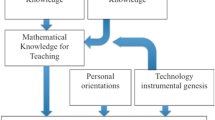Abstract
This speech discusses the need to incorporate a global perspective and account for the reality of constant and rapid change when revising the science and math curricula.
Similar content being viewed by others
References
Carnegie (Carnegie International Peace National Commission) (1992).Changing Our Ways, Carnegie Endowment for International Peace, Brookings Institute, Washington, DC, p. 1.
CSTB (Computer Science and Telecommunications Board) (1993).Computing Professionals: Changing Needs for the 1990s. Office of Science and Engineering Personnel, National Research Council, National Academy Press, Washington, DC, p. 136.
Krupnick, C. G. (1985). Women and men in the classroom: Inequality and its remedies.On Teaching and Learning: The Journal of the Harvard-Danforth Center 1:18–25.
Schneider, S. H. (1993). A better way to learn.World Monitor 6(4): 31–36.
Tobias, S. (1991).They're Not Dumb, They're Different. Research Corporation, Tuscan, Arizona.
Author information
Authors and Affiliations
Additional information
This paper comprises a speech, the Karplus Lecture, given at the National Science Teachers Association Annual meeting, Kansas City, Missouri, April, 3. 1993
Rights and permissions
About this article
Cite this article
Wilson, L.S. Changing our ways: Teaching for a different future. J Sci Educ Technol 3, 3–6 (1994). https://doi.org/10.1007/BF01575811
Issue Date:
DOI: https://doi.org/10.1007/BF01575811



